Grammarly vs. Wordvice AI: Which Writing Assistant is Better?
With the emergence of AI tools powered by ChatGPT and other large language models (LLMs), many students, researchers, and business professionals are realizing just how important it is to revise their text before submitting their work–and now they have nearly unlimited options for online revision.
One of the most popular options is the use of online proofreading apps and grammar checkers such as Wordvice AI's AI Writing Assistant and Grammarly. These free online writing apps are packed with cutting-edge features and are often available at very low cost.
This article compares the new Wordvice AI Proofreader with the well-known proofreading app Grammarly. Find out how to use both and how they can enhance your writing process.
Wordvice AI vs Grammarly: Introduction
What is Wordvice AI?
Wordvice AI is an AI-powered writing checker app created by Wordvice, a professional editing and proofreading service. In addition to its free AI Proofreading Tool, which is the subject of this article (as Grammarly’s best-known function is also it’s proofreading tool), they also offer a free paraphrase tool, a free AI Translator, a free AI Text Summarizer, an AI Plagiarism Checker, and an AI Detector.
Wordvice’s primary customer base is college students, graduate students, academic researchers, and business professionals. Their focus is on helping these people improve their dissertations, theses, college admissions essays, and science manuscripts, but they also handle thousands of business documents and blog content each year. It is no surprise that Wordvice AI shines when used for academic and admissions documents, as we demonstrate below.
Wordvice AI is available as a web app with MS Word add-ons and Chrome extensions coming soon to give you acces to the Online Writing Assistant in more places.
What is Grammarly?
Grammarly is one of the most well-known proofreading apps and has become ubiquitous among students and writers of all types. It is available as a stand-alone app and browser extension. It also integrates with all sorts of platforms such as Microsoft Office 365 and Google Docs.
As the most feature-rich grammar checker on the market, it’s very useful to use Grammarly as a benchmark when discussing any other proofreading tool. However, there are major downsides as you will find out relating to cost and its controversial data collection policy.
Price Comparison
Aspiring researchers and academics are often college or graduate students. While most universities do offer Grammarly as part of their technology package, it is helpful to compare pricing for budget-minded individuals.
Grammarly – a very popular online proofreader
Grammarly’s pricing structure is typical of a Software-as-a-Service (SaaS) model. There are three plans with the free tier being a functional albeit limited preview into the full-featured paid version.

With any SaaS app, you need to dive into the pricing details. Most SaaS advertise their long-term plans (annual or multiple years) as the list price.


When it comes to college students writing admissions essays or researchers who are preparing one large dissertation or manuscript, annual pricing is not very efficient, as many will end up canceling after just one month.
Wordvice AI – a free writing assistant and proofreader with a suite of revision tools
Wordvice AI offers a free Basic plan that allows users access to multiple editing and paraphrasing modes and up to 5,000 words of text to revise with any revision tool.
Wordvice AI offers Basic and Premium plans, the details of which can be accessed on the Wordvice AI Pricing page. To get started with AI Paraphrasing, AI Text Summarizing, free AI Grammar Checker, or free AI Translation, all you need to do is create an account and choose the tool that best suits the revision needs of your document. All of these tools can be accessed with a Basic plan, but the AI Plagiarism Checker will require you to sign up for a Premium plan.

Who Should Use Grammarly and Wordvice AI?
With so many free proofreading tools on the market, choosing just one can be confusing. While many more people use Grammarly, does that mean it is the best app for technical, academic, and research writers? Perhaps not, especially with Wordvice AI’s new suite of proofreading, paraphrasing, summarizing, and language editing tools. Let’s take a look.
Grammarly – Great for students and bloggers
Grammarly shines when it is used as a general writing tool – and there are two common types of casual writers:
- High school and college students writing assignments and essays
- Bloggers, marketers, and copywriters writing articles, marketing sales copy, and informational pieces.
Access to Grammarly Premium offers a few great options for these groups.
Plagiarism Checker
By far, the most common reason to pay for Grammarly is its plagiarism checker. In fact, it exists as a standalone tool and as a built-in tool whenever it checks your writing.
Many students just learning how to write college essays as well as bloggers who are pressed for time rely on plagiarism checkers such as Grammarly’s to satisfy ethical standards.
Writing Goals
Another useful feature in Grammarly is its ability to set its writing tone – as stated above, this is perfect for the general writer who may need to write a job resume, blog post, marketing email, or creative essay.
One of the key areas of comparison below is testing its “Academic” tone selector with that of Wordvice AI.
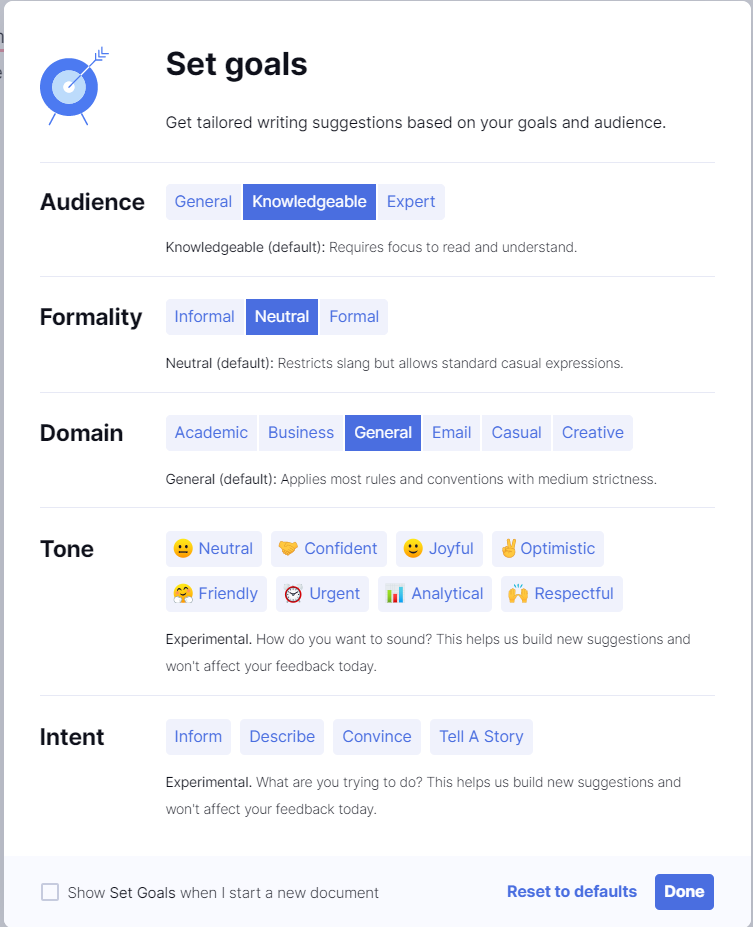
Wordvice AI – Best for college applicants and researchers
As mentioned above, Wordvice AI was built on millions of words of edited data from essays, dissertations, and research manuscripts. It is also powered by AI models, including ChatGPT, among others.
This is known as machine learning, and it is the exact same method other online proofreading apps like Grammarly use to “learn” and improve. However, Wordvice AI was created based on its own userbase of graduate students and researchers, meaning it is perfect for everyone from college applicants to science writers.
Comparing Grammarly vs Wordvice AI – Functional Test
Below is a series of functional examples that demonstrate where both of these grammar checkers shine and where they could be improved. The intention is for readers to determine when and for whom these tools are most useful.
As academic or essay writing in a second language is a huge concern for many students, the area of focus will be science, academic, and research writing in the context of common mistakes that non-native English speakers or ESL speakers make.
The following specific use cases will be explored:
- Email Correspondence
- Verb tense shifts (past/present)
- Plural versus singular verb tense agreement
Email Correspondence
Our first example will be general correspondence between a student and his/her professor. University students and researchers must write emails to research institutions, professors, and professional colleagues all the time, so making sure even casual emails look good is important – and can have professional implications.
This passage with many errors was entered into both tools:
Dear Professor, Thank you for writ to me. Thank you for writ to me. Thank you for writ to me. Thank you for writ to me. Im glad you able access account. Please let me now if you can help in anyway. Thanks lot, Support
Grammarly email edit
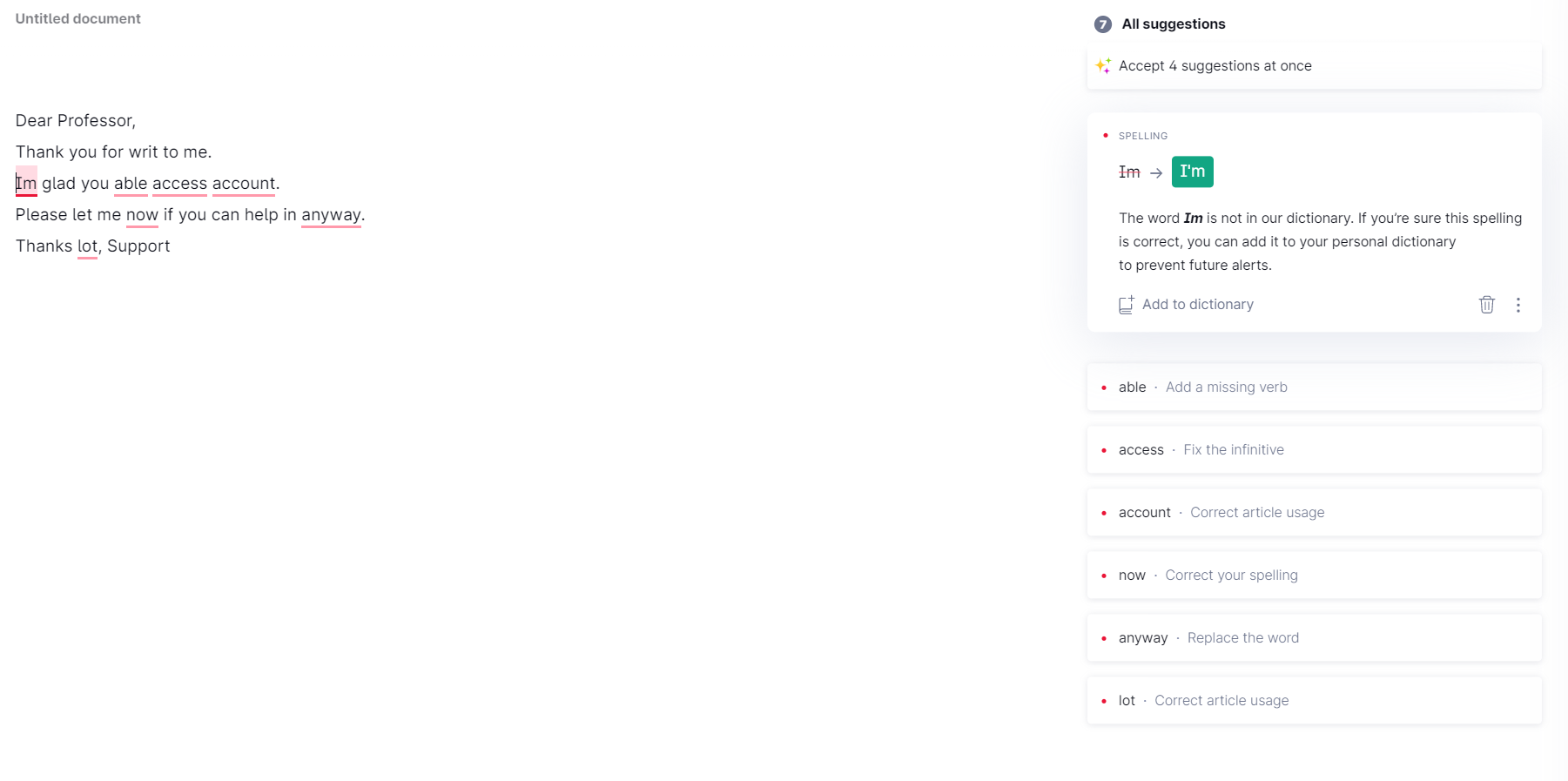
Grammarly did not detect the error writ. This is because writ is an actual word in the English language meaning “a formal written document”. However, in this example, writ should NOT be used as a noun and was intended to be writing.
Another issue found is small but relevant - Grammarly made the below correction to the account error. This correction lacks contextual understanding and thus suggests the article “the” instead of the more appropriate possessive pronoun “your,” which was suggested by the Wordvice AI proofreading tool with the “Standard“ editing mode applied. This is an email between two people, so it is reasonable to assume that the topic of the email (account access) means that one person owns an account.
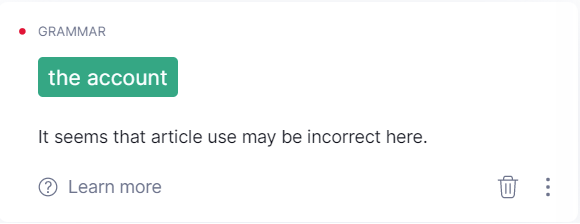
Wordvice AI email edit
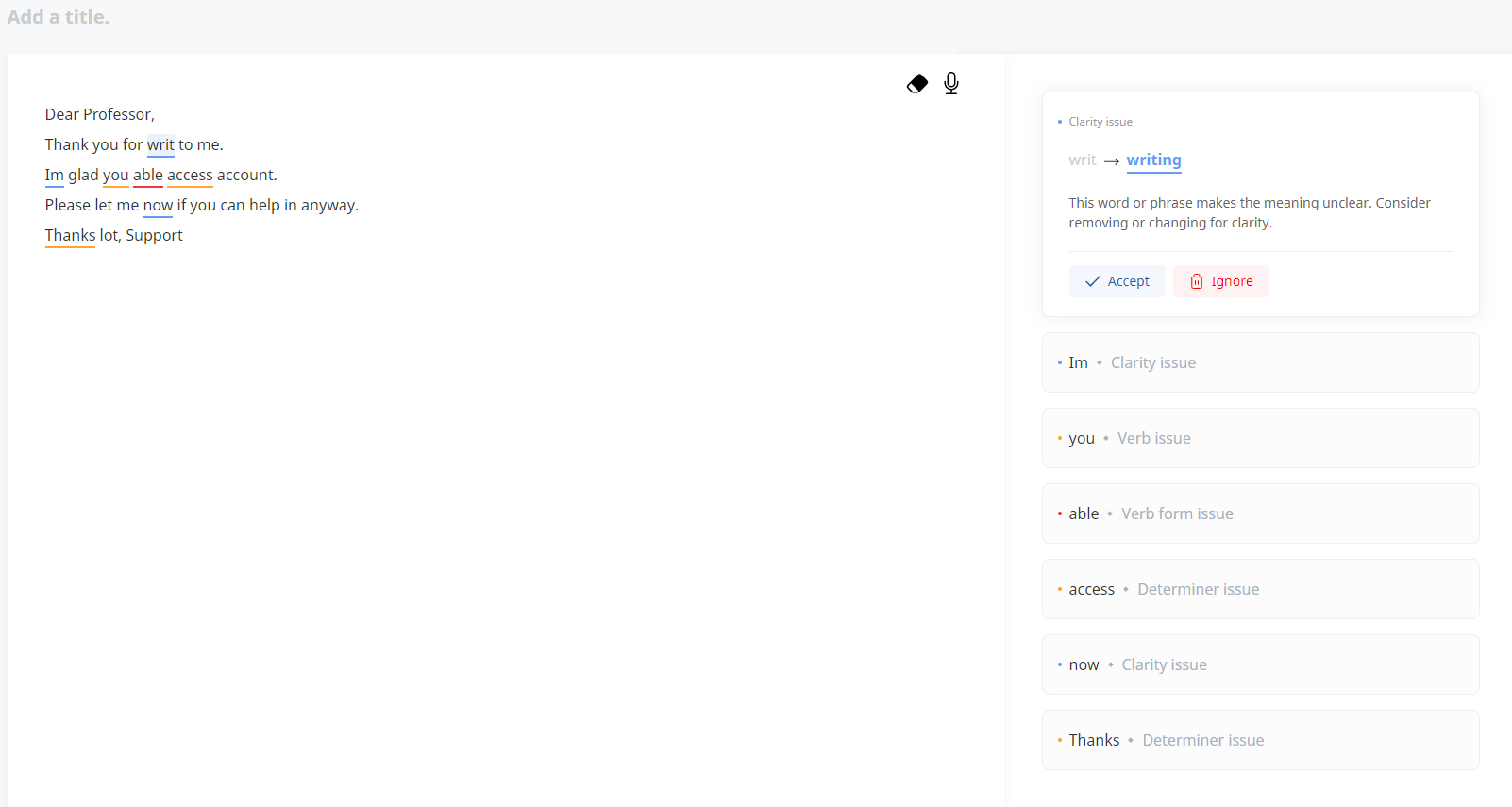
The Wordvice AI Proofreader correctly detected the writ error and made the correct suggestion to writing.
As shown, Wordvice AI very clearly demarcates the type of error as according to color:
- Blue: Clarity issue
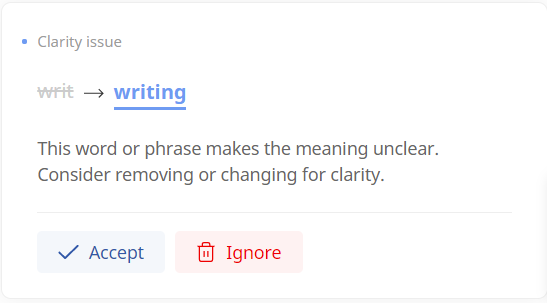
- Yellow: Verb issue

- Red: Verb form issue
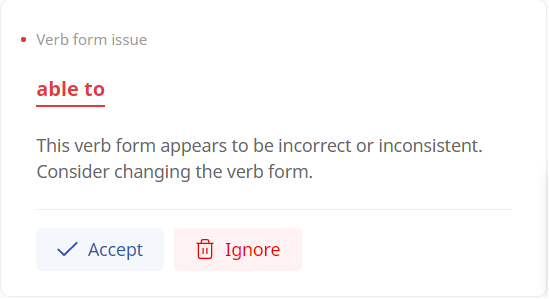
Compared to the Grammarly edit above, Wordvice AI makes a more nuanced correction to the account error by adding the possessive your. Thus, the full statement reads, “I’m glad you are able to access your account,” which makes a lot more sense.
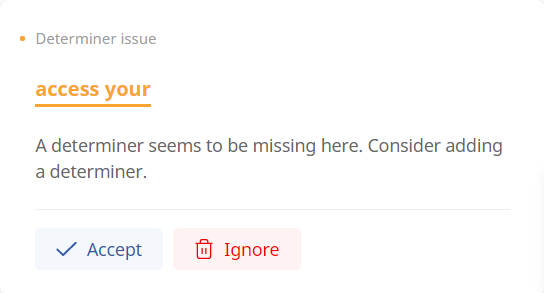
- Verb tense shifts (past/present)
Verb tense in research and academic writing has some specific rules.
Past tense
- Results
- Observations
- Methods (passive voice)
- Specific references to past events (even in the literature)
Present tense -Literature citations -General scienfitif statements -Future applications -Scientific claims at the end of a study
These rules can confuse even experienced scientific writers and editors, so it’s good to test these.
The following passage with errors was used:
We observed that the cellular structure was not change, although Kim et. al. established that the lipid membrane is resistant to hydrophilic conditions.
Grammarly verb tense corrections

The correct change is simply changed. However, Grammarly relies too heavily upon the input was not change and maintained this grammatical structure in its suggestions.
The problem is that Grammarly does not have sufficient experience with ESL scientific writing. Experienced academic editors know that ESL researchers often misuse past continuous form.
Grammarly views the past continuous input as an intended input - so it maintains it in its suggestion. In reality, it is obvious that the correct way to communicate here is changed, as the sentence is reporting an observation.
Grammarly continues to output a pattern of technically correct but contextually (science, academic writing) incorrect suggestions. This stems from the fact that Grammarly is trained based on volume and not on targeted writing.
In other words, Grammarly’s suggestions will cater to what its algorithm determines is the most common solution among its tens of millions of users. However, research writing will never be as popular as blog or article writing. So this is another case where Grammarly can come up short.
Wordvice AI verb tense corrections

Wordvice AI correctly makes this straightforward change to was.
Plural versus singular verb tense agreement
Another common writing and grammar issue is singular vs plural verb tense agreement. This is when writers confuse the singular and plural between nouns and verbs.
The following passage with errors was used:
The data shows that rates of obesity have increased, whereas the numbers of cells was reduced by erythromycin.
Grammarly tense agreement corrections

Grammarly makes two glaring mistakes here.
First, one of the most common singular vs plural mistakes is with the word data. Data is a plural term, and its usage is strict in academic writing. However, it is often used as both singular and plural in conversational writing or speaking.
Again, this is an instance where Grammarly’s overly general learning model results in a missed correction - simply put, it is well accepted by Grammarly that data can be singular, even though this is wrong.
Secondly, Grammarly suggests changing both numbers and was because it assesses these as two separate, disconnected grammar issues. However, you cannot change numbers > number and was > were, as Grammarly suggests, because that would result in “the number of cells were.” And that is also wrong.
The correct suggestion should be to only correct numbers > number while keeping was.
Wordvice AI tense agreement corrections
Wordvice AI correctly recognizes data as a plural noun. It also correctly identifies that only numbers should be changed while leaving was alone.

Wordvice AI vs Grammarly: Which grammar checker wins?
In the end, there is no best online proofreader for everyone. Even though Grammarly is the most used and is based on the widest variety of inputs, it certainly lacks specific usability especially when it comes to research writing.
Meanwhile, the Wordvice AI Proofreader seems to be more atuned to catch style errors in academic and admissions writing. And because it incorporates powerful language models along with its own proprietary editing data, its output tends to yield more accurate and sophisticated results than Grammarly, especially when filters such as editing modes and document types are applied.
For any author, it is important to take a holistic, well-rounded approach to editing and proofreading. Use all available tools that are appropriate for each specific type of writing. And follow-up with professional editing in order to take your essay, research paper, or blog content to the next level.
See other use cases on Wordvice AI tools to make the most of its powerful revision capabilities:



